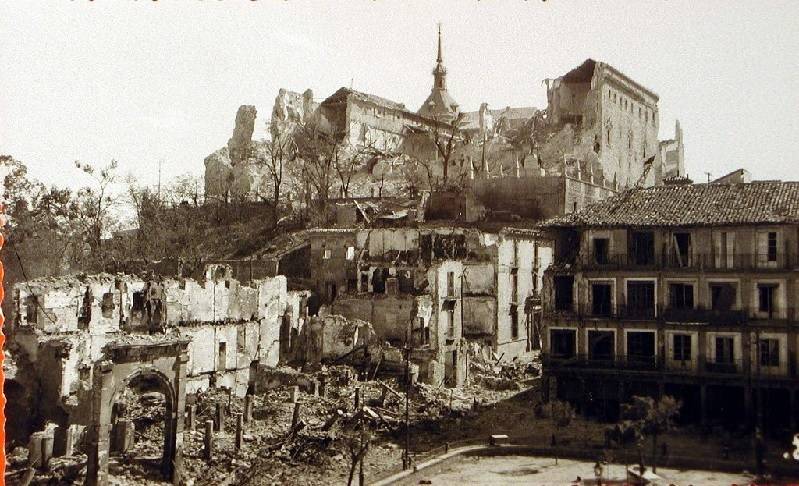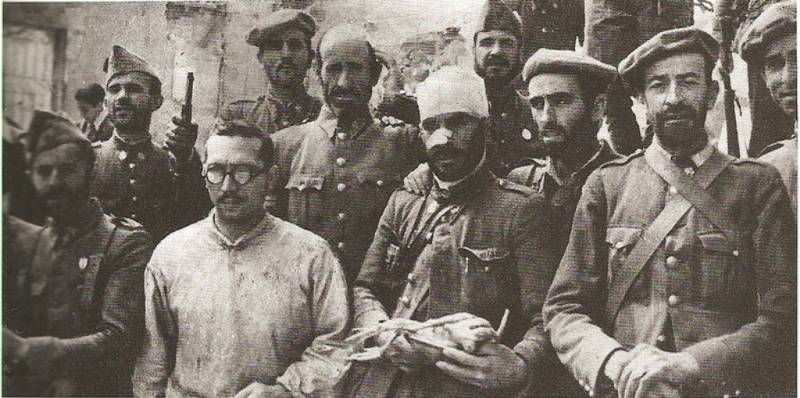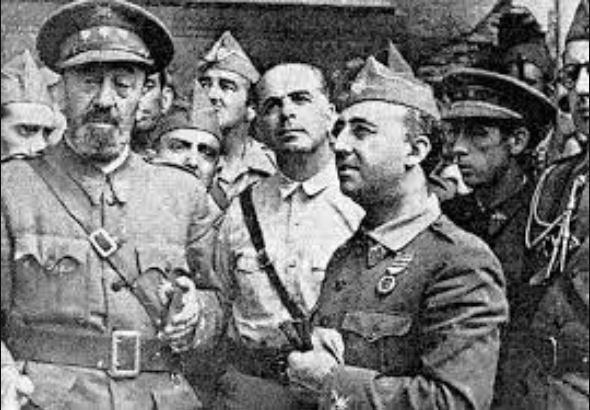“We don’t leave our own”: the role of the deblockade of the Alcazar fortress on the course of the civil war in Spain

Military historian Elena Sergeevna Senyavskaya in her book “The Psychology of War in the XNUMXth Century: historical experience of Russia" notes that the wars of the 1th century clearly demonstrated that even with a multiple increase in the role of the technical factor, it is impossible to achieve victory without a certain moral and psychological state of the army and the population. At the same time, the maintenance of morale during the war is carried out, first of all, by ideological means and tools. As a rule, the moral and psychological state of the troops depended to a decisive extent on the clear ideological motivation of the war, on the intensity and accuracy of "political and educational work", and their underestimation contributed to the defeat even in the presence of sufficient military-strategic potential [XNUMX].
This statement about the key role of ideological motivation and propaganda operations, which have a strong influence on the state of the morale of the troops, should be taken extremely seriously, because historical experience proves it right. The deblockade of the Alcazar fortress in Toledo by the Spanish nationalists is, of course, one of the most striking examples of propaganda operations that seriously affected the moral and psychological state of the Spaniards from the traditionalist camp. This question is explored in this article.
The beginning of the Spanish Civil War and the plans of Francisco Franco
The original plan of the rebels, developed by General Francisco Franco Baamonde and General Emilio Mola, called for a quick coup d'etat in Spain and did not provide for long-term hostilities.
As the historian Denis Mikhailovich Krelenko notes in his work “Francisco Franco: the path to power”, in general terms the plan was as follows - it was assumed that all eight military districts, the fleet and the troops of the protectorate would oppose the republic. On this score, there was an agreement with all the commanders. Success in Madrid seemed doubtful, since it was in the Madrid district that most of the officers loyal to the government were concentrated. Therefore, several columns had to be moved towards Madrid from different directions. At the same time, Tercio and other military units from Morocco were supposed to be transferred to the peninsula. First it was planned to take possession of Madrid, then Barcelona. Success was possible only if the army secured control over the major centers of the country [2].
However, it was not possible to carry out a quick coup d'état (the usual pronuccimiento for Spain), relying mainly on the forces of the army, and the plan failed. The failure is due to a number of reasons, among which the first and most important is the position taken by the military fleet, who supported the government of the Second Republic, and this did not allow the use of the African Army, the main trump card of the traditionalists.
The second reason was that the conspirators, who correctly assessed the weakness of the government of the Second Republic, did not take into account the energy and capabilities of the political parties and movements that supported it and managed to organize the masses of supporters of the republican regime [2]. Well, the third reason is the poor coordination of actions and the passivity of the leadership of the rebels, who often preferred passive waiting in the barracks to active actions on the streets.
In early August, the uprising moved to another qualitative level - a full-scale civil war began. Moreover, from that moment on, third countries were involved in the Spanish events. Priority in this respect belonged to non-nationalists: even before the nationalists appealed to Germany and Italy, the republican government sent a telegram calling for help to French Prime Minister Leon Blum [2].
On August 6, 1936, Franco ordered an attack on Madrid. The plan of this operation characterizes him as a far-sighted military leader: having abandoned spectacular but risky steps, the general chose an option that did not promise immediate success, but was distinguished by caution and at the same time strategic literacy. The temptation to carry out the advance of troops along the line of Cordoba - Ciudad - Real - Toledo - Madrid was great.
This path promised the possibility of a quick capture of the capital. But in case of failure, both groups of nationalists would still remain divided, since Extremadura lay between the zones controlled by them, where the power of the republic remained [2]. Franco was aware of the danger of this situation, so he moved the army southwest to Estremzdura. The successful advance of the African Army columns began along the Seville-Bodajos-Telovera arc. General command was exercised by Franco, the troops were led by Colonel Yagüe.
Within a month, the nationalists advanced 500 kilometers and completed their tasks. Therefore, already in September, Franco faced the question of which direction to continue the offensive. It seemed that everything was clear: located only 60-70 km from Madrid and informed about the weakness of the enemy, the army had to, using all its forces, immediately go to the capital [2]. However, here Franco made a rather unexpected decision for many - he moved part of the troops from the direction of Madrid towards the Alcazar of Toledo, where from the very beginning of the military mutiny, a group of rebels led by Colonel José Moscardo was under siege.
The British historian Hugh Thomas, in his book on the Spanish Civil War, notes that General Alfredo Kindelan asked Franco if he understood that a deviation from the plan could cost him Madrid? Franco agreed that this is quite possible [3]. Why did he make such a decision, and what was the reason for it?
The blockade of the Alcazar fortress and its defense
Colonel José Moscardo, who led the nationalists in Toledo, on July 22, 1936, was forced to lock himself with his supporters in the Alcazar fortress-palace, where he was pushed back by the Republican militia, taking advantage of numerical superiority.

1 people barricaded themselves in the fortress, 300 of them were members of the civil guard, 800 were officers, 100 were Falangists or armed supporters of other right-wing parties, and 200 were cadets of the academy (who were dismissed for the summer holidays). In addition, the colonel took with him 190 (according to other sources - 550) women and 520 children. In addition, according to Moscardo's own statements, he took with him hostage the civil governor Manuel González Lopez with his whole family and a number of left-wing politicians. The garrison was well supplied with ammunition from a nearby weapons factory, but provisions were in short supply from the very beginning of the siege. The basis of food in the Alcazar was bread and horse meat (at the beginning of the siege there were 50 horses) [177].
Attempts by the Ministry of War and the government to force Colonel Moscardo to surrender were unsuccessful. On July 23, Candido Cabello, head of the Toledo militia, called Colonel Moscardo and said that if he did not surrender the Alcazar in ten minutes, then he, Cabello, would personally shoot Luis Moscardo, the son of the colonel, who was taken prisoner that morning. Colonel Moscardo said that he did not need mercy.
The Alcázar's resistance pissed off the Republicans besieging it. Throughout August there was gunfire on both sides. The defenders of the fortress, well prepared and sheltered by walls, conducted aimed fire, and the republican militia made no attempt to storm to end the siege. Through megaphones, both sides exchanged insults and boastful statements. Although the Falangists had plenty of ammunition, they had no hope of an early release. They were completely cut off from the outside world and had no idea what was going on in the rest of Spain. They had no electricity, and instead of salt they used plaster from the walls [3].
French nationalists supporting Franco - the philosopher and publicist Henri Massis (1886-1970) and the writer Robert Brasilillac (1909-1945) - in their book "The Cadets of the Alcazar", dedicated to the defenders of the fortress, noted that the dead were buried in cellars.
Living conditions in the Alcazar became more difficult every day. At the end of August, the defenders of the fortress had almost no food left - the daily bread ration was cut to 180 grams per person. The Republicans decided to put an end to the resistance by breaking through an underground tunnel under the walls and laying mines under the two towers closest to the city. To prevent chaos that could arise after the explosions, the civilian population was evacuated. War correspondents were invited to Toledo, who were to witness the gala concert with the fall of the Alcazar [3].
On September 18, the Republicans blew up the southeast tower. The building was reduced to rubble. The republicans, having overcome the ruins, hoisted a red banner on the equestrian statue of Charles V in the courtyard of the fortress. But the charge under the northeast tower did not explode. Four officers armed with revolvers drove the Republicans back from the north tower. On September 20, five gasoline trucks were prepared at the Santa Cruz hospital. The walls of the Alcazar were flooded with a flammable liquid. To ignite it, grenades were used. A cadet jumped out of the Alcazar, using a fire hose. He was killed, but the hose was pulled back into the Alcazar [3].
September 23, General José Varela, who replaced the ill General Yagüe, moved to Toledo; the two columns advancing from the north were led by Colonels Asensio and Barron. Realizing the seriousness of the situation, the government of the Republic decided to speed up the assault on the fortress. An assault guard arrived in Toledo from Madrid to finally complete the siege of the fortress. On September 25, the last of the mines was detonated, causing one of the towers of the Alcazar to collapse into the Tagus River. But the powerful stone foundation of the fortress was not damaged. Meanwhile, General Varela was already fifteen kilometers from the Alcazar.
On September 26, Varela cut the road connecting Toledo with Madrid. At noon on September 27, the assault on Toledo began. The Republicans faltered and fled in a hurry, leaving behind the full arsenals of the weapons factory. When Colonel Moscardo gathered his officers and soldiers in the courtyard of the Alcazar to meet General Varela, who did not want to enter the city except in full dress uniform, he went to meet him, saluted him and said:
Why did Toledo turn out to be more important for Franco than Madrid?
Franco's decision caused a lot of discussions, the participants of which asked themselves the question: did it make sense, for the sake of a tactical event, to divert part of the troops from fulfilling the strategic goal - capturing the capital? In Franco's opinion, the spiritual significance of the release of Colonel Moscardo and his people was more important than an immediate attack on Madrid, and he had good reason for that.

As Denis Krelenko notes, by taking Toledo, F. Franco, firstly, fully secured the southern flank of the columns marching on Madrid, and secondly, captured an important communication hub, the shortest route connecting the center and west of the country with Andalusia. Of course, the military-strategic position of his troops was improved. However, the main thing was the moral and propaganda impact that this operation had on the nationalists - by his actions, Franco instilled confidence in his supporters that "in the event of an encirclement, everything will be done to save them" [3].
These battles for the Francoists of Spain became a symbol of the selfless heroism of their troops. They laid the foundation for the propaganda myth about the decisive role of the rebel army in the civil war and the sanctity of their goals; General Moscardo (after the deblockade of the Alcazar he was awarded the rank of general - Note) became an example for the nationalists, showing not only his military superiority over the Republicans, but also moral - he refused to surrender, in response the Republicans executed his son [5].
The French nationalist monarchist movement "French Action" (Action française) led by Charles Maurras (1868-1952) and his allies, representatives of the next generations of French nationalists - the philosopher and publicist Henri Massis (1886-1970) and the writer Robert Brasilillac (1909-1945 ), supporting the Spanish nationalists, actively promoted the heroism of the defenders of the Alcazar and the policy of F. Franco.
Charles Maurras called the defense of the Alcazar "a lesson in superhuman heroism and purely human fidelity", adding pathetically:
In hot pursuit, Massis (the idea belonged to him) and Brasilillac wrote the book "The Cadets of the Alcazar", which sold 60 copies and was translated into Spanish, English, Italian and Swedish [000]. The Francoists themselves actively used these battles in propaganda.
The cruelty of the opponents caused the fighters of both camps of the civil war to fear the possibility of being surrounded, being captured. After the Toledo operation, the nationalists suffered from this fear much less. Their defense was stubborn to the limit, even in the environment they retained confidence in the help from "their own". This circumstance was noted by E. Lister, the enemy of F. Franco, one of the most capable and skillful military leaders of the Republicans, and what could be more valuable for the commander than the recognition of his merits by the enemy [3]?
The attack on Toledo testified, among other things, that Franco was the first among the leaders of the traditionalist movement to stop thinking in terms of rebellion and realize that the rebellion had grown into a protracted war. Otherwise, it is difficult to explain his desire to improve the general situation at the front through an operation in the Madrid direction. Correctly understanding the changes in the organization of the armed forces that were taking place on the other side of the front, in particular the creation of six mixed brigades of the nascent People's Army, General Franco was in a hurry to use his advantages. The success of the Toledo operation largely determined the success of Franco in the struggle for leadership that was unfolding in the camp of national-traditionalists [3].
Использованная литература:
[1] Senyavskaya E.S. Psychology of war in the XX century: the historical experience of Russia. – M.: ROSSPEN, 1999.
[2] Krelenko D. M. Francisco Franco: the path to power. - Saratov: Sarat Publishing House. un-ta, 2002.
[3] Thomas, Hugh. Civil War in Spain. 1931–1939 – M.: Tsentrpoligraf, 2003.
[4] Brasillac Robert, Massis Henri. Cadets of the Alcazar. – M.: Totenburg, 2019.
[5] The Red Army and the Spanish Civil War. 1936–1939: Collections of information materials of the Intelligence Directorate of the Red Army: in 8 volumes. - M .: Political Encyclopedia, 2019.
[6] Molodyakov V. E. (2019) Against anarchy and Hitler: French nationalism and the civil war in Spain // Contours of global transformations: politics, economics, law. T. 12. No. 4. S. 166–182.
Information